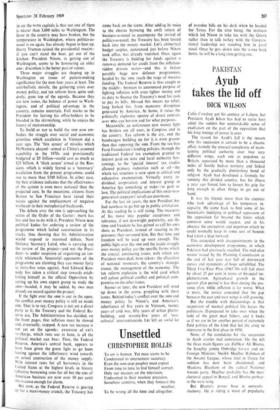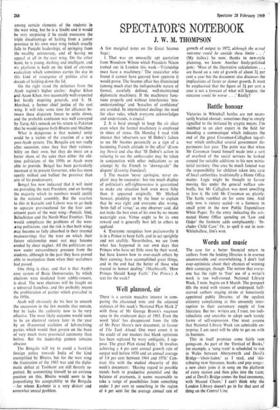Ayub takes the lid off
PAKISTAN DICK WILSON
Colin Cowdrey got his century at Lahore, but President Ayub Khan has had to retire hurt amid the sudden but unmistakable sense of exultation on the part of the opposition that his long innings of power is over.
The reason for Ayub's fall is the reason why his succession is certain to be a chaotic affair, namely the unusual complexity of main- taining political authority over two very different wings, each one as populous as Britain, separated by more than a thousand miles of hostile Indian territory and linked only by the gradually diminishing bond of religion. Ayub had developed a formula for running this divided country, but his illness a year ago forced him to loosen his grip for long enough to allow things to get out of hand.
It was his friends more than his enemies who took advantage of his temporary in- capacity. He came back to find some of his lieutenants indulging in political repression of the opposition far beyond the limits which common sense would suggest, and in his absence the corruption and nepotism which he could normally keep in some sort of bounds had taken a leap forward.
This coincided with disappointments in the economic development programme, in which Pakistan had previously excelled. The mid-plan review issued by the Planning Commission at the end of last year was full of downward curves and statements of hope unfulfilled. The Third Five-Year Plan (1965-70) will fall short by about 25 per cent in terms of financial im- plementation. Agricultural growth in the current plan period is less than during the pre- vious plan, while inflation is far worse. What is more, the review conceded that the gap between the east and west wings is still growing.
But ,the trouble with dictatorships is that suspension of normal political life leaves the politicians ill-prepared to take over when the hold of the great man falters, and it looks as if we are in for another period of extremely fluid politics of the kind that led the army to intervene in the first place in 1958.
None of the candidates for the succession to Ayub carries real conviction. On the left the three main figures are Zulfikar Ali Bhutto, the haughty young Oxbridge lawyer and ex- Foreign Minister; Sheikh Mujibur Rahman of the Awami League, whose trial in Dacca for sedition has now been abandoned; and Maulana Bhashani of the radical National Awami party. Mujibur probably has the most electoral appeal in Bengal, and Bhutto perhap, in the west wing.
But Bhutto's power base is somewha shadowy. He is riding a wave of popularity among certain elements of the students in the west wing, but he is a Sindhi and it would be very surprising if he could overcome the triple disadvantage of hailing from a junior province in his own west wing (which usually falls to Punjabi leadership), of springing from the wealthy aristocracy, and of having no appeal at all in the east wing. On the other
band, he is young, dashing and intelligent, and Jais platform is built on the kind of extreme radicalism which sometimes carries the day in this kind of resurgence of politics after a decade of holding down the lid.
On the right stand the defectors from the Ayub regime's higher circles: Asghar Khan and Azam Khan, two reasonably well-respected but hardly inspiring generals, and S. M. Murshed, a former chief justice of the east
wing. It will take some time for alliances be- tween these disparate forces to settle down, and the probable confusion was well conveyed
by Tariq Ali's remark on his return to Pakistan that he would oppose both Bhutto and Mujibur. What is dangerous is that national unity could be a victim of the creation of a new post-Ayub system. The Bengalis are not really
after secession, since they fear their vulnera- bility on their own, but they_ do insist on a
better share of the cake than either the old- time politicians of the 1950s or Ayub were able to provide. Bengal has been particularly incensed at its present Governor, who has more openly milked and bullied the province than any of his predecessors.
Bengal has now indicated that it will insist on providing the next President, and on having the majority which its numbers would justify in the national assembly. But the reaction to this in Karachi and Lahore was to go back
to separate provincehood for the four con-
stituent parts of the west wing—Punjab, Sind, Baluchistan and the North-West Frontier. This would complicate the problems of the west- sing politicians, and the risk is that both wings slay become so fully absorbed in their internal manoeuvrings that the trust on which their future relationship must rest may become eroded by sheer neglect. All the politicians are now under extraordinary pressure from the students, although in the past they have proved able to manipulate them when their usefulness had passed.
One thing is clear, and that is that Ayub's cosy system of Basic Democracies, by which
elections were insulated from rabble-rousers, is dead. The next elections will be fought on a universal franchise, and this probably means the proliferation of parties which prevailed in the 1950s.
Ayub will obviously do his best to smooth the succession in the few months that remain, but he lacks the authority now to be Avery effective. The most likely outcome would seem to be an electoral victory later in the year by an ill-assorted coalition of left-inclining parties which would then govern on the basis of very much more provincial autonomy than before. But the leadership pattern remains obscure.
The Bengalis will try to avoid a hawkish foreign policy towards India of the kind exemplified by Bhutto, but for the west wing the frustration of the 1965 war and the diplo- matic defeat at Tashkent are still fiercely re- gretted. By committing himself to an extreme position on this, Bhutto would seem to be jeopardising his acceptability to the Bengalis —for whom Kashmir is a very distant and somewhat unreal problem.



































 Previous page
Previous page